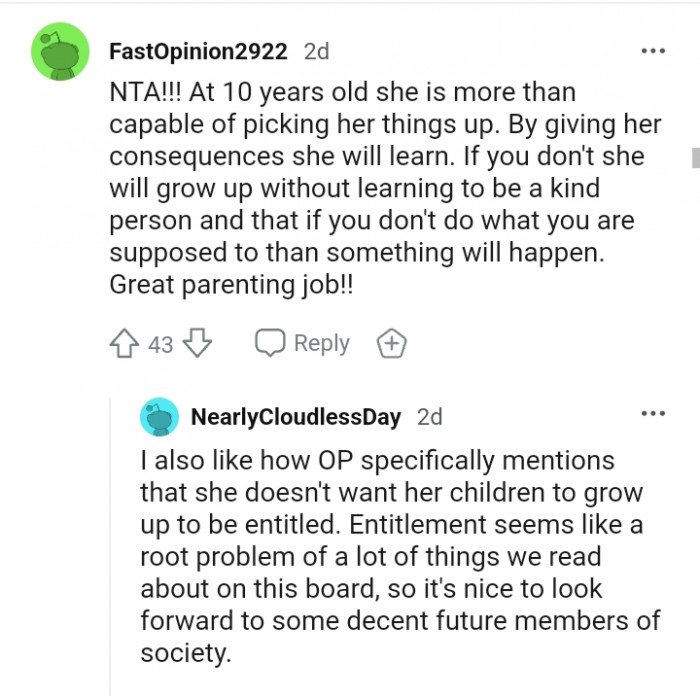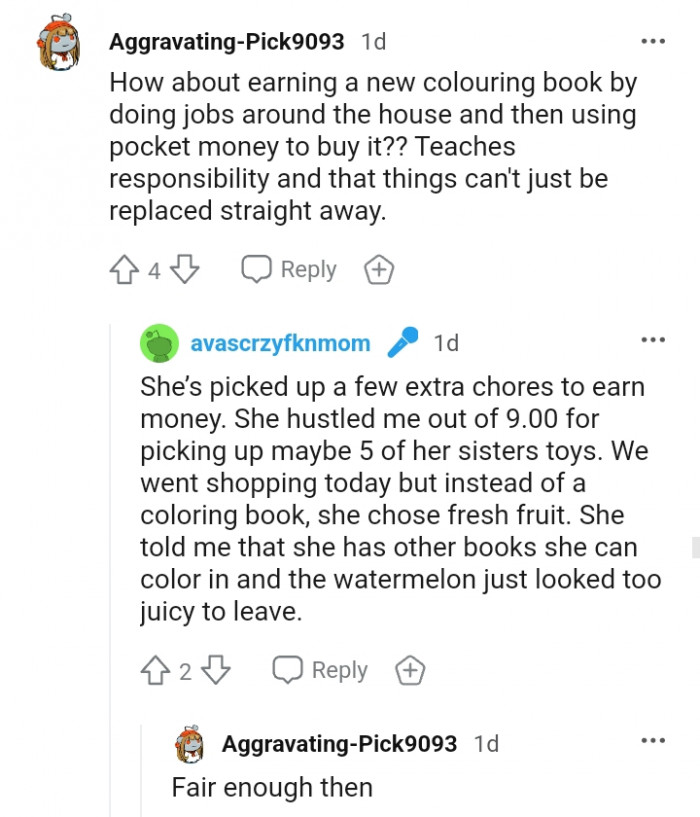Mom Refuses To Give Her Coloring Book To 10-Year-Old Daughter After The Dog Peed On Hers
The key to raising kids who are more secure, exhibit improved confidence, and eventually achieve more is to hold them to a higher standard, set boundaries, and have realistic expectations for their behavior. There are many factors to consider if you want your child to grow up to be a productive adult.
Even if you like your children, you sometimes have to let them learn from their mistakes and bear the repercussions of their choices. In the end, you will be their support system as a parent, but you also can't act as their "catcher in the rye."
This is what the OP in today's AITA story was trying to do. The OP always likes to buy herself and her 10-year-old daughter matching coloring books.
This coloring book is huge and has a big unicorn poster in it. It happened that her daughter left her book and her crayons on her bedroom floor, and her dog peed on the book and chewed up the crayons.
This occurred after the OP told her to pick up her things, and she didn’t. The OP told her to bring the pup outside; she didn’t.
Her daughter also didn’t have a potty pad down for the puppy, so what was she expecting? Now, the daughter wants the OP's coloring book, and the OP refuses to give it to her.
Read the entire story for yourself below.
And here, we have the headline...

The OP's daughter's dog peed on the book then chewed up the colors

Among the hundreds of comments this story received, we've gathered some of the top ones for you to read through below

Entitlement and Parenting
Dr. Anna Smith, a developmental psychologist at Stanford University, explains that parenting practices significantly influence children's sense of entitlement. Her research indicates that when parents consistently provide for their children’s needs without setting boundaries, children may develop unrealistic expectations about what they deserve.
This can lead to conflicts, as seen in this scenario with the mother refusing to give her daughter a coloring book. Setting limits is crucial in teaching children about sharing and the realities of life.
Understanding Parenting and Entitlement
Dr. Lisa Sanders, a child psychologist, explains that parenting styles significantly influence children's perceptions of entitlement. Research shows that overindulgence can create a sense of entitlement in children, which often leads to conflicts within family dynamics. This can be particularly pronounced when parents fail to set appropriate boundaries, leading children to expect immediate gratification.
Understanding these dynamics is crucial for parents aiming to raise children who appreciate and respect their possessions and responsibilities.
She is now reaping the rewards

Coloring together is a bonding activity

This Redditor believes the kid shouldn't be responsible for the dog

From a psychological standpoint, it's essential to consider how experiences shape a child's understanding of fairness and entitlement. According to studies published in the Journal of Child Development, children learn to navigate social norms through observation and experience. When parents model generosity without balance, it can create confusion about what is deserved.
In this case, the mother's refusal can be viewed as an attempt to instill lessons about entitlement and the importance of valuing possessions.
The refusal to share resources like a coloring book can serve as a teaching moment about empathy and sharing. Studies in developmental psychology suggest that teaching children about the value of sharing can enhance their emotional intelligence. When parents model behaviors that emphasize sharing and cooperation, they help children develop important social skills that contribute to healthy relationships.
The OP says the dog is not her daughter's sole responsibility

It will not simply be replaced

By giving her consequences, she will learn

Effective Parenting Strategies
To address feelings of entitlement, experts recommend implementing consistent consequences and teaching children about empathy. Encouraging children to understand the feelings of others can cultivate a sense of gratitude. Activities such as volunteering can help children appreciate what they have while learning to share and care for others.
Additionally, setting aside time for discussions about feelings and possessions can foster emotional intelligence and understanding. This approach helps children learn the value of respect and sharing.
Setting Boundaries as a Parenting Strategy
Experts recommend that setting clear boundaries around possessions can help children understand the importance of respect and responsibility. Dr. Madeline Levine, a renowned child psychologist, states, "Establishing boundaries not only helps children feel secure but also teaches them essential life lessons." By communicating the reasons behind these boundaries, parents can foster understanding and cooperation, as noted on her website madelinelevine.com. In this case, explaining the situation regarding the dog and the coloring book can help the child learn about consequences and the importance of caring for personal items.
An already trained dog is different from a puppy

The OP clarifies again that they share responsibility

This comes with some pain on the part of the child

It's also important to highlight the role of communication in parenting. Open discussions about fairness, sharing, and the consequences of actions can help children develop a more balanced perspective. Research shows that children who engage in such dialogues tend to develop healthier relationships with their peers and family.
By modeling these conversations, parents can guide their children toward more meaningful interactions and a deeper understanding of social dynamics.
From a cognitive-behavioral perspective, teaching children about consequences can be more effective than simply denying them access to items. Research indicates that children learn best when they understand the rationale behind their parents' decisions. By framing the explanation in a way that emphasizes the importance of taking care of belongings, parents can cultivate responsibility and reduce feelings of entitlement.
Don't get her a coloring book immediately

You are very set on making your daughter suffer

You are right to try and teach her lessons

The Role of Emotional Regulation in Parenting
Emotional regulation plays a crucial role in parenting, particularly when addressing issues of entitlement. Studies from Yale University show that parents who model emotional regulation are better equipped to teach their children how to manage their feelings. By demonstrating calmness and understanding in challenging situations, parents can create a more supportive environment for their children to learn about responsibility and empathy.
Moreover, teaching children how to express their emotions healthily can significantly reduce conflicts and promote healthier family dynamics.
It is good you are teaching her responsibilities

You are not doing this dog any favors

Did you validate her feelings at all?

Moreover, avoiding the use of punitive measures can foster a more positive parent-child relationship. Research indicates that punitive parenting can lead to fear and resentment, which negatively impact children's emotional development. Instead, fostering a nurturing environment where children feel safe to express their emotions can lead to greater emotional intelligence and resilience.
This is truly an important life lesson

Things can't just be replaced straight away

This Redditor shares an even sadder learning experience

Teaching Empathy Through Shared Experiences
Integrating lessons about empathy into everyday experiences can enhance children's understanding of sharing and caring for others. Research suggests that children who engage in cooperative activities develop stronger social skills and empathy. For example, involving children in decisions about sharing can help them understand the importance of considering others' feelings.
This not only nurtures empathy but also reinforces the idea that shared experiences can lead to deeper connections and understanding.
Your kid could teach your dog bad habits

Due to their small bladders, puppies urinate more frequently than adult dogs. The dog ought to be taken outdoors regularly enough if it is sleeping in the OP's daughter's room.
Redditors advise OP to make sure she's not praising her initiative as much as she's letting her bear the costs of her sloth. Drop your own thoughts about this story in the comments below.
Ultimately, the refusal to share a coloring book can be viewed as an opportunity for growth. By approaching the situation with empathy and understanding, parents can guide their children toward becoming more responsible and caring individuals. This approach aligns with modern parenting philosophies that prioritize emotional intelligence and empathy in child-rearing practices.
Psychological Analysis
This situation illustrates the importance of balancing boundaries with empathy in parenting. When children feel entitled, it often reflects a lack of understanding regarding the value of shared resources. Teaching children about responsibility and the importance of caring for their belongings can cultivate a deeper sense of appreciation and cooperation within the family.
Analysis generated by AI
Analysis & Alternative Approaches
In conclusion, understanding the psychological underpinnings of entitlement in children can lead to more effective parenting strategies. As supported by research, setting boundaries, modeling emotional regulation, and teaching empathy are essential components of raising well-adjusted children.
Through these practices, parents can foster a sense of responsibility and cooperation in their children, ultimately contributing to healthier family dynamics.
Analysis & Alternative Approaches
In conclusion, the dynamics of entitlement in parenting are complex and require thoughtful navigation. By setting boundaries, encouraging empathy, and fostering open communication, parents can help their children develop a realistic understanding of sharing and appreciation. This not only supports healthy emotional development but also leads to more harmonious family relationships.



